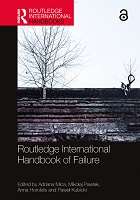Chapter 12 Economising Failure and Assembling a Failure Regime
Proposal review
Author(s)
Kurunmäki, Liisa
Mennicken, Andrea
Miller, Peter
Language
EnglishAbstract
Sociologists have largely neglected the topic of failure, and particularly the economising of failure, notwithstanding notable exceptions. This is puzzling, given the many adjacent literatures that have addressed the practices and processes of economising. Four features define our approach. First, it is argued that failure has none of the objectivity or inevitability often attributed to it. Second, it is suggested that failure be viewed as a variable ontology object. Third, attention is directed to the calculative infrastructures that operationalise the ideas of failing and failure, and enable them to be acted upon. Fourth, emphasis is placed on the importance of distinguishing between failing and failure. The chapter proceeds in three stages. First, it considers the neglect of the topic of failure in sociology. Second, it examines briefly the economising of the economy through the economising of failure for the corporate world across more or less the whole of the nineteenth century and the first half of the twentieth century. Third, it examines the economising of the public sphere and particularly the domain of hospital-based healthcare in England across the first two decades of the twenty-first century. In conclusion, we identify possible further lines of enquiry.
Keywords
economising, failure, failing, infrastructure, variable ontologyDOI
10.4324/9780429355950-15ISBN
9780367404048, 9781032371047, 9780429355950Publisher
Taylor & FrancisPublisher website
https://taylorandfrancis.com/Publication date and place
2023Imprint
RoutledgeClassification
Society and culture: general
Sociology


 Download
Download Web Shop
Web Shop